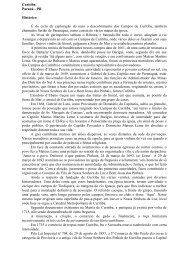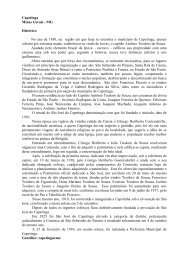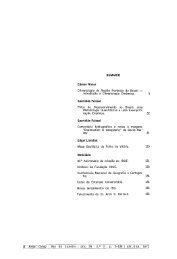Isaac Kerstenetzky - Biblioteca - IBGE
Isaac Kerstenetzky - Biblioteca - IBGE
Isaac Kerstenetzky - Biblioteca - IBGE
Create successful ePaper yourself
Turn your PDF publications into a flip-book with our unique Google optimized e-Paper software.
<strong>Isaac</strong> <strong>Kerstenetzky</strong>, fomentador das estatísticas brasileiras:<br />
perfi l do cientista e do humanista<br />
Professor <strong>Isaac</strong> <strong>Kerstenetzky</strong> (1926-1991)<br />
Estudioso da teoria econômica, o professor <strong>Isaac</strong> teve o exato entendimento da importância<br />
da abordagem sistêmica das estatísticas econômicas. Compreendeu o papel relevante<br />
das contas nacionais não só como instrumento substantivo a serviço da análise econômica,<br />
mas, sobretudo, na coordenação das estatísticas, como marco conceitual.<br />
Responsável pelo Sistema Estatístico do Brasil, teve a necessária antevisão da importância<br />
de tal instrumento, para dar início, em sua gestão no <strong>IBGE</strong> (1970-19792 ), ao projeto de<br />
elaboração das Contas Nacionais, na concepção mais ampla, integrando as matrizes de<br />
insumo-produto. Criou um grupo de estudos, ligado diretamente à presidência e composto<br />
por jovens economistas, para estudar a teoria e a metodologia de construção de<br />
matrizes. Este mesmo grupo, mais tarde, formaria a equipe do então recém-criado Departamento<br />
de Contas Nacionais, que assumiu, no <strong>IBGE</strong>, o projeto de elaboração do Sistema<br />
de Contas Nacionais, completo e moderno.<br />
Esta publicação é, portanto, fruto da visão do professor <strong>Isaac</strong> <strong>Kerstenetzky</strong> sobre o Sistema<br />
das Estatísticas Econômicas.<br />
A ele, nosso reconhecimento.<br />
***<br />
Ao seu falecimento, a Revista Brasileira de Economia (v. 45, n. 3, p. 333-383, jul./set.<br />
1991), da Fundação Getúlio Vargas, rendeu-lhe marcante homenagem publicando três<br />
artigos de saudades – de Werner Baer, de Mário Henrique Simonsen, de Anníbal Villela<br />
– dos quais extraímos alguns trechos, como segue:<br />
<strong>Isaac</strong> <strong>Kerstenetzky</strong>: social scientist, por Werner Baer (p. 335-336)<br />
Ever since I knew <strong>Isaac</strong>, he was interested in quays in which statistical information could ultimately<br />
help the policy-maker in planning the allocation of resources so as to maximize economic growth,<br />
subject to the constraints of an adequate concern for equity. It was fortunate for the country<br />
that he became president of <strong>IBGE</strong>, which enabled him to infl uence the development of new statistical<br />
information necessary for the country’s policy-makers who where faced with an increasingly<br />
complex economy. Among his most important contributions at <strong>IBGE</strong> was the organization and<br />
the administration of the 1970 census, which was a vast improvement over the preciously, semiaborted<br />
1960 census; the huge consumer budget study (ENDEF), which enormously increased the<br />
frontier of social-economics analysis in Brazil; the PNAD surveys, providing periodic information<br />
on a whole host of social-economic information; the expansion of the economic censuses in order<br />
to produce an input-output table which was usable for updating the national accounts system and<br />
for making more adequate sectorial impact studies; the computerization of the <strong>IBGE</strong> system, which<br />
made it possible to rapidly process the myriad of data being generated by the newly instituted<br />
information system, and he laid the groundwork for the transfer of national accounts from de the<br />
Fundação Getulio Vargas to <strong>IBGE</strong>. In other words, under <strong>Isaac</strong>’s leadership, Brazil’s statistical<br />
information system made gigantic strides forward.<br />
Also of importance during <strong>Isaac</strong>’s tenure of the <strong>IBGE</strong> presidency was the a itude he tried to instill<br />
in the producers of information. He made an eff ort to have the consumers of data produced by<br />
the <strong>IBGE</strong> system make their needs known to him and his staff . This would help the la er develop<br />
a system of information which would be of maximum use to the nation. Although <strong>Isaac</strong> made<br />
giant contributions to the country’s informational system and was fascinated by techniques which<br />
could make the information generated useful to the economic planner, he was not a rigid believer<br />
in a planned economy. He felt that a vast system of social-economic information, combined with<br />
appropriate quantitative techniques, could serve policy-makers in systems with diff erent mixes of<br />
private and public enterprises. It could be used for systems where the State’s direct participation in<br />
the economy was relatively small and where planning would be of an indicative type, or in systems<br />
where the participation of the state was relatively strong.<br />
2 Na obra este período está registrado erradamente, qual seja, 1971-1979. Fizemos a correção na transcrição.<br />
157



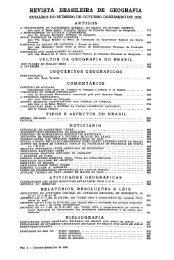
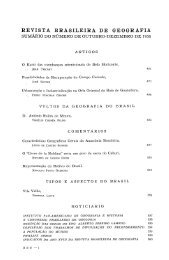



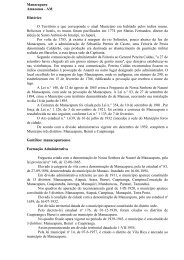
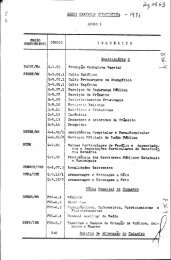
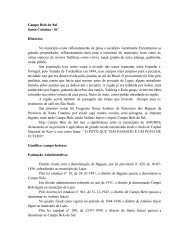
![Manual de Estatística [Fillippo Virgillii] - Biblioteca do IBGE](https://img.yumpu.com/17097551/1/185x260/manual-de-estatistica-fillippo-virgillii-biblioteca-do-ibge.jpg?quality=85)

